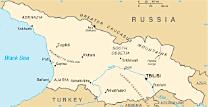Georgian Foreign Minister David Bakradze travels to the United States this week to consult with American officials and attend an emergency session of the U.N. Security Council regarding the latest crisis affecting Russian-Georgian relations.
On April 16, President Vladimir Putin precipitated the most recent flare-up by instructing Russian officials to establish direct legal and economic relations with separatist regimes in Abkhazia and South Ossetia without first obtaining the approval of the central Georgian government in Tbilisi. Putin's decree also authorized Russian government offices located in Krasnodar Territory and North Ossetia, Russian territories adjacent to the two breakaway regions, to provide consular services to the residents of Abhazia and South Ossetia, many of whom hold Russian passports.
Observers have long speculated that Russia might respond to Western recognition of Kosovo's independence by supporting the independence of Abkhazia, South Ossetia, and other separatist governments operating in the territory of the former Soviet Union. Although Putin's April 16 decree does not formally recognize the independence claims of the Abkhazian and South Ossetian separatists, it bolsters their claims of autonomy by treating them as if they were independent governments.

